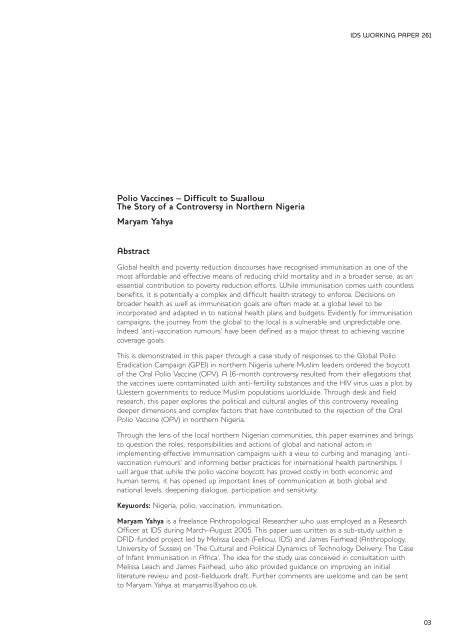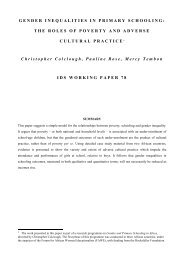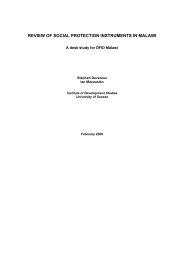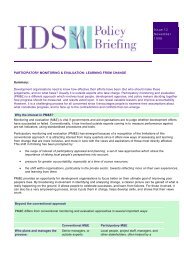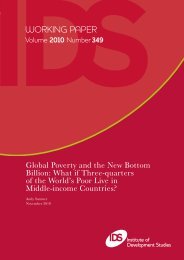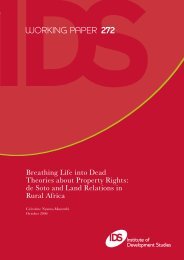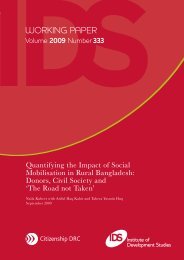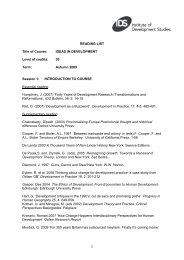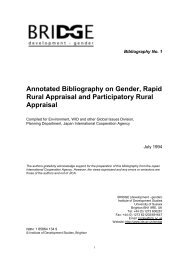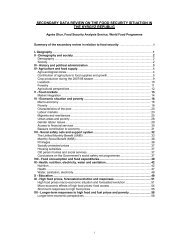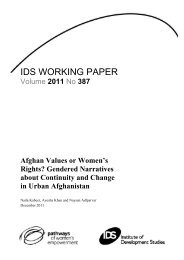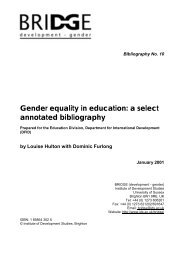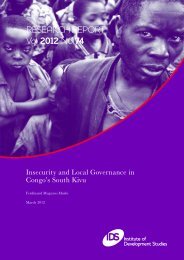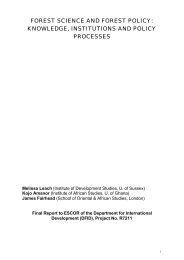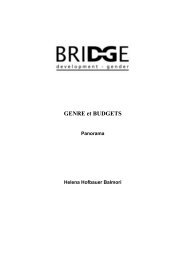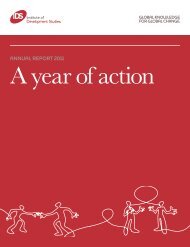WORKING PAPER 261 - Institute of Development Studies
WORKING PAPER 261 - Institute of Development Studies
WORKING PAPER 261 - Institute of Development Studies
Create successful ePaper yourself
Turn your PDF publications into a flip-book with our unique Google optimized e-Paper software.
IDS <strong>WORKING</strong> <strong>PAPER</strong> <strong>261</strong><br />
Polio Vaccines – Difficult to Swallow<br />
The Story <strong>of</strong> a Controversy in Northern Nigeria<br />
Maryam Yahya<br />
Abstract<br />
Global health and poverty reduction discourses have recognised immunisation as one <strong>of</strong> the<br />
most affordable and effective means <strong>of</strong> reducing child mortality and in a broader sense, as an<br />
essential contribution to poverty reduction efforts. While immunisation comes with countless<br />
benefits, it is potentially a complex and difficult health strategy to enforce. Decisions on<br />
broader health as well as immunisation goals are <strong>of</strong>ten made at a global level to be<br />
incorporated and adapted in to national health plans and budgets. Evidently for immunisation<br />
campaigns, the journey from the global to the local is a vulnerable and unpredictable one.<br />
Indeed ‘anti-vaccination rumours’ have been defined as a major threat to achieving vaccine<br />
coverage goals.<br />
This is demonstrated in this paper through a case study <strong>of</strong> responses to the Global Polio<br />
Eradication Campaign (GPEI) in northern Nigeria where Muslim leaders ordered the boycott<br />
<strong>of</strong> the Oral Polio Vaccine (OPV). A 16-month controversy resulted from their allegations that<br />
the vaccines were contaminated with anti-fertility substances and the HIV virus was a plot by<br />
Western governments to reduce Muslim populations worldwide. Through desk and field<br />
research, this paper explores the political and cultural angles <strong>of</strong> this controversy revealing<br />
deeper dimensions and complex factors that have contributed to the rejection <strong>of</strong> the Oral<br />
Polio Vaccine (OPV) in northern Nigeria.<br />
Through the lens <strong>of</strong> the local northern Nigerian communities, this paper examines and brings<br />
to question the roles, responsibilities and actions <strong>of</strong> global and national actors in<br />
implementing effective immunisation campaigns with a view to curbing and managing ‘antivaccination<br />
rumours’ and informing better practices for international health partnerships. I<br />
will argue that while the polio vaccine boycott has proved costly in both economic and<br />
human terms, it has opened up important lines <strong>of</strong> communication at both global and<br />
national levels, deepening dialogue, participation and sensitivity.<br />
Keywords: Nigeria, polio, vaccination, immunisation.<br />
Maryam Yahya is a freelance Anthropological Researcher who was employed as a Research<br />
Officer at IDS during March–August 2005. This paper was written as a sub-study within a<br />
DFID-funded project led by Melissa Leach (Fellow, IDS) and James Fairhead (Anthropology,<br />
University <strong>of</strong> Sussex) on ‘The Cultural and Political Dynamics <strong>of</strong> Technology Delivery: The Case<br />
<strong>of</strong> Infant Immunisation in Africa'. The idea for the study was conceived in consultation with<br />
Melissa Leach and James Fairhead, who also provided guidance on improving an initial<br />
literature review and post-fieldwork draft. Further comments are welcome and can be sent<br />
to Maryam Yahya at maryamis@yahoo.co.uk.<br />
03


